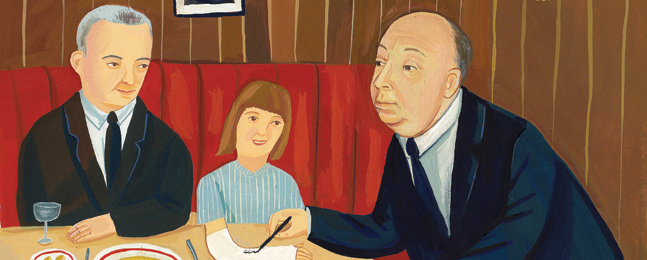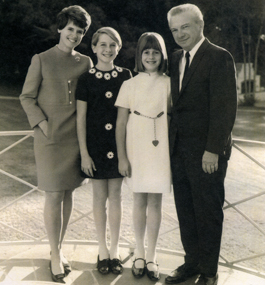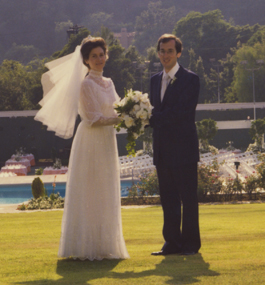Hollywood Girlhood
Long before she came to Brandeis, a Beverly Hills insider lived in Betty Grable’s mansion, had close encounters of the celebrity kind — and wondered whether glamour is all it’s cracked up to be.

Illustration by Giselle Potter
by Kathy Lawrence
It wasn’t until I left home for college on the East Coast that I realized how unusual my Beverly Hills childhood was. Movie glamour shed an unreal glow over our everyday existence, as if California’s natural sunlight had been lit by the key grip on a soundstage.
My parents and their circle of friends, many of whom were tied to the “industry,” lived with a kind of gusto that was itself cinematic: eating, drinking, laughing, traveling, driving, dancing and boating like players in a Rosemary Clooney/Bing Crosby musical. In an era when a certain amount of strictness still ruled childrearing, my generation mostly watched these antics from offstage. When we were allowed onstage, we sometimes found ourselves walking on red carpets, sitting in the private theaters of the men who made the films we watched or working on set as an extra.
My father’s family escaped the pogroms of Russia in advance of the Bolsheviks, landing in America in 1910. As the youngest of nine children, with parents who clung to their Orthodox Judaism and Yiddish, my father raised himself on the streets of Chicago’s South Side before making his way west by car at 17.
He put himself through night school at the University of Southern California by tap dancing and sewing in Paramount’s costume department under legendary costume designer Edith Head. During World War II, my father served with distinction as an Army captain in intelligence for the Pacific theater. During this time, he invented a parachute suit requisitioned by the Army, thus garnering the capital to open textile factories in Japan at the war’s end. He was the first U.S. manufacturer allowed to enter this former hostile nation, now his trade partner.
My father’s friends came from that Old Hollywood world built on vaudeville and the studios. They started the Jewish country club Hillcrest in response to LA’s widespread anti-Semitism. Hillcrest provided a substitute for family and community left behind in Russia and the industrial Northeast. The old men’s grill at Hillcrest was where I sat with my father and the Marx Brothers, George Burns, Milton Berle and so many others.
Some of my parents’ best moments took place at Chasen’s. My father and Dave Chasen, owner of the famous restaurant that bore his name, had been close friends since they arrived in LA in the 1920s. Like my father, Chasen had come from Russia and had worked in vaudeville. A true bon vivant, my father had a regular table there, next to Alfred Hitchcock and Liz Taylor. My father loved Chasen’s, not because of its glamour but because of its comfort. Like Hillcrest, it compensated for a lost home. There, he and his friends were off-camera and part of a world without prejudice. One evening at Chasen’s, as I sat with my father, Hitchcock came by to sign the cast on my recently broken arm.

Kathy Lawrence, second from right, with her older sister and parents in the 1960s.
page 2 of 2
Grand houses provided the backdrop for this intense existence, the places where fantasy and reality merged. My own circle of friends, their parents often producers, directors, movie moguls or actors, grew up in places of unreal beauty. One friend lived with her grandfather, who had been a silent-film star, in a house that enshrined his great past. Giant reels of celluloid unraveled in disorderly decay outside his screening room, a fitting emblem of his forgotten glory. Amidst the verdant plantings and fountains dotting his canyon estate, the aging star had built his granddaughter a playhouse resembling a Swiss chalet.
Another friend lived in a Spanish mansion on the block of Beverly Drive just above Sunset Boulevard, where lithe palm trees lined either side and waved in the Santa Ana winds. The house was hidden from the street by giant stucco walls behind which bloomed rare camellias and giant ferns. Her father was a famous comedian who could record only at midnight with her mother by his side as assistant and muse. They would return home as dawn crept over the Hollywood hills, sleeping into the afternoon. Because my friend could not see her parents in the light of day, they sprinkled her bed with little presents tied with ribbons and notes of love. The closets of her child-size dressing room had feather boas in every color.
 |
| Kathy and Fred Lawrence on their wedding day in her family's backyard. |
Our house was no exception. William Powell built the French provincial manse in the ’30s as a gift for his beloved but doomed Jean Harlow. After her death in 1937, the house went to Betty Grable and George Raft, who supposedly installed the gas pump in the three-car garage. The house took on a life of its own as the scene of my parents’ lavish parties and charity events. On weekends, there were tennis tournaments and barbeques, and many a film was shot in the dramatic grounds that stretched for two acres from the terrace down to the rose garden, pool and tennis court. Universal once drained the Olympic-size pool for a Jonathan Winters TV special. I remember a film starring Susan Hayward that was shot in the billiards room, where she entered in a light-blue chiffon gown, took up a pool cue and accused her leading man of murder. My sister and I ran wild most days, climbing trees with abandon and hiking the hills of Coldwater Canyon that rose behind the house. We awoke to the warm-up scales of Howard Keel across the street and Mel Torme next door.
The ancients wrote “Et in arcadia ego” — there is trouble in paradise — and my parents’ LA milieu was no exception. As beautiful as our world was, a dark past shadowed us. Everyone in our largely Jewish circle had gone literally from rags to riches. Their delirious pleasure was in inverse proportion to previous hardship. They had all escaped from something — pogroms, poverty or discrimination. The haunting precariousness of life only intensified their newfound delight in Los Angeles’ climate and sense of freedom. For the first time, they could breathe. The vast film industry they created was in some sense a reflection of their wish fulfillment. Perhaps their pain was as gargantuan as their daring, but it is the way they lived their lives that I remember.
Kathy Lawrence, a senior lecturer in the English department, is the wife of President Fred Lawrence.
